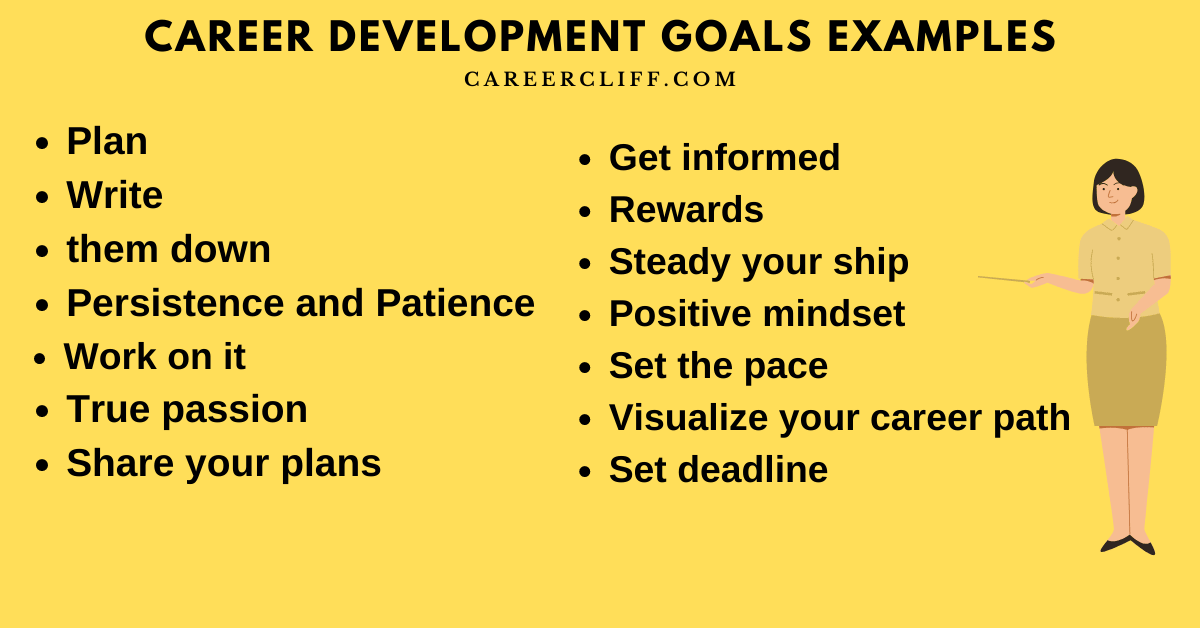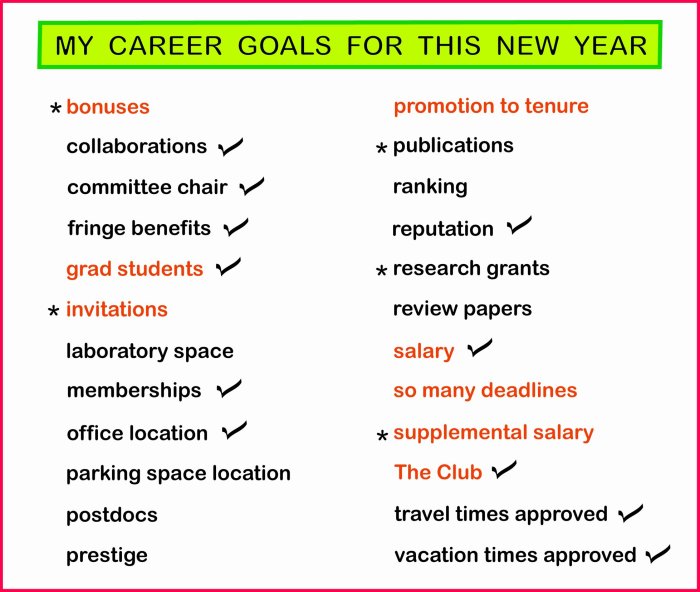Career Development Goals set the stage for your professional journey, guiding you towards success and fulfillment. As we delve into the realm of career aspirations, let’s uncover the key elements that pave the way for a thriving career.
From defining your goals to creating actionable plans, this exploration will equip you with the tools needed to navigate the intricate landscape of career development.
Defining Career Development Goals

Setting clear career development goals is crucial for guiding individuals in their professional journey. It helps in providing direction, motivation, and a sense of purpose to work towards. Without goals, individuals may feel lost or stagnant in their careers.
Importance of Setting Career Development Goals
- Goals provide focus and direction, helping individuals prioritize tasks and make informed decisions.
- Setting goals allows individuals to measure progress, celebrate achievements, and stay motivated.
- Having clear goals can enhance job satisfaction and overall happiness in one’s career.
Examples of Short-term and Long-term Career Goals
- Short-term goal: Obtain a certification in a specific skill within the next six months.
- Long-term goal: Secure a leadership position within the next five years.
Contribution of Career Development Goals to Professional Growth
- Goals challenge individuals to step out of their comfort zones and acquire new skills.
- By setting goals, individuals can track their progress and identify areas for improvement.
- Career development goals encourage continuous learning and personal growth, leading to advancement in one’s career.
Creating SMART Goals

To set effective career development goals, it’s essential to follow the SMART criteria. SMART stands for Specific, Measurable, Achievable, Relevant, and Time-bound.
Specific
- Be clear and precise: Define exactly what you want to achieve in your career.
- Example: Instead of saying “I want to improve my communication skills,” specify “I want to enhance my public speaking skills by attending a toastmasters club.”
Measurable
- Quantify your goals: Make sure you can track and measure your progress.
- Example: Instead of saying “I want to network more,” specify “I want to attend two networking events per month.”
Achievable
- Set realistic goals: Ensure that your goals are within reach and feasible.
- Example: Instead of saying “I want to become a CEO in two years,” specify “I want to become a team leader within the next year.”
Relevant
- Align your goals with your career aspirations: Make sure they contribute to your overall career progression.
- Example: Instead of saying “I want to learn a new language,” specify “I want to learn Spanish to enhance my chances of working in a global company.”
Time-bound
- Set deadlines for your goals: Establish a timeline to keep yourself accountable.
- Example: Instead of saying “I want to switch careers,” specify “I want to transition into a new industry within the next six months.”
Assessing Skills and Interests: Career Development Goals
When it comes to setting career goals, assessing your skills and interests is crucial for success. By understanding what you are good at and what you enjoy doing, you can create realistic and achievable goals that align with your strengths and passions.
Evaluating Current Skills
To evaluate your current skills, start by making a list of your strengths and weaknesses. Consider the skills you have developed through education, work experience, and personal hobbies. You can also ask for feedback from colleagues, friends, or mentors to gain a different perspective on your abilities.
- Take online assessments or career quizzes to identify your key strengths.
- Reflect on past projects or tasks where you excelled and pinpoint the skills that helped you succeed.
- Seek opportunities for professional development to enhance your skills further.
Identifying Areas for Improvement
Once you have assessed your current skills, it is essential to identify areas where you can improve. This could involve learning new technical skills, enhancing soft skills like communication or leadership, or gaining certifications relevant to your desired career path.
- Set specific goals for skill development, such as taking a course or attending workshops.
- Seek feedback from supervisors or mentors on areas where you can grow.
- Create a plan with actionable steps to bridge the gap between your current skills and the skills required for your career goals.
Aligning Goals with Personal Interests
Aligning your career goals with your personal interests can significantly impact your motivation and success. When you are passionate about the work you do, you are more likely to stay committed, overcome challenges, and achieve your objectives.
- Reflect on activities or subjects that genuinely excite you and consider how they can be incorporated into your career.
- Explore job roles or industries that align with your interests to find a fulfilling career path.
- Stay updated on trends and developments in your field of interest to maintain enthusiasm and drive towards your goals.
Developing a Career Plan
To ensure a successful career path, it is essential to create a comprehensive career development plan that Artikels your goals and the steps needed to achieve them. This plan acts as a roadmap to guide you towards your desired career outcomes and helps you stay focused and motivated along the way.
Setting Milestones and Timelines
Setting milestones and timelines in your career plan is crucial for tracking your progress and staying on course. By breaking down your long-term goals into smaller, manageable milestones, you can celebrate achievements along the way and adjust your plan as needed. Timelines provide a sense of urgency and accountability, helping you stay motivated and focused on reaching your goals in a timely manner.
- Establish short-term, medium-term, and long-term milestones to track progress.
- Set specific deadlines for each milestone to create a sense of urgency and focus.
- Regularly review and adjust timelines based on progress and changing circumstances.
Tools and Resources for Career Planning, Career Development Goals
There are various tools and resources available to help you develop a structured career roadmap and make informed decisions about your career path. Utilizing these resources can provide valuable insight and guidance as you navigate the complexities of career planning.
Online career assessment tools can help you identify your strengths, interests, and values to determine suitable career paths.
- Career counseling services can offer personalized guidance and support in creating a tailored career development plan.
- Networking with professionals in your desired field can provide valuable insights and mentorship to help you make informed decisions.
- Professional development workshops and courses can enhance your skills and knowledge, making you more competitive in the job market.
Seeking Mentorship and Guidance
Seeking mentorship and guidance is a crucial step in achieving career development goals as it provides individuals with valuable support, advice, and insights from someone who has already walked the path they aspire to follow. A mentor or career coach can offer guidance, share their experiences, and help navigate the challenges that may arise along the way.
Role of Mentorship in Achieving Career Development Goals
Mentorship plays a vital role in helping individuals set realistic goals, stay motivated, and develop the skills necessary to succeed in their chosen career path. Mentors can provide feedback, encouragement, and constructive criticism to help individuals grow and improve.
- Mentors can offer valuable insights and advice based on their own experiences and knowledge.
- They can help individuals identify their strengths and weaknesses, as well as opportunities for growth.
- Mentors can provide networking opportunities and connections that can help individuals advance in their careers.
Benefits of Having a Mentor or Career Coach
Having a mentor or career coach can provide numerous benefits, including:
- Guidance and support in setting and achieving career goals.
- Access to valuable advice, insights, and industry knowledge.
- Increased confidence and motivation to overcome challenges and obstacles.
- Networking opportunities and connections that can open doors to new opportunities.
Mentorship in Navigating Career Challenges
Mentorship can be especially valuable in helping individuals navigate career challenges by:
- Providing a different perspective and helping individuals see challenges as opportunities for growth.
- Offering emotional support and encouragement during difficult times.
- Sharing strategies and tips for overcoming obstacles and achieving success.